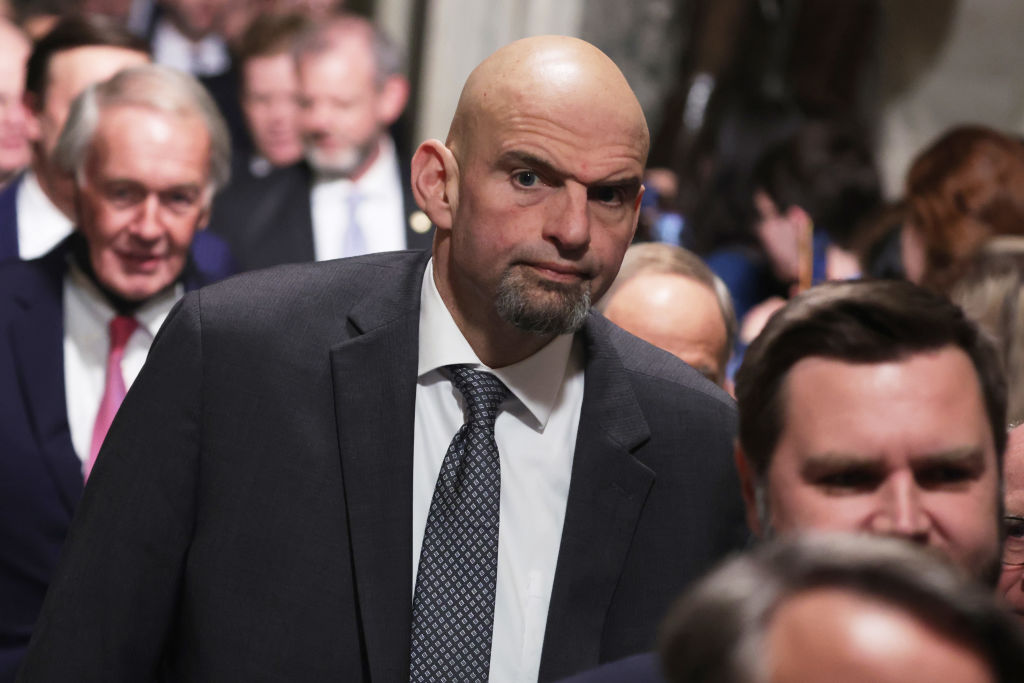Does the New York Times think it is helping John Fetterman?
It’s been almost a year since John Fetterman suffered a life-changing stroke and less than a month since he admitted himself for in-patient psychiatric care at Walter Reed Medical Center to deal with severe depression. But the New York Times is pleased to report that everything is just fine in Fetterman World.
Okay, I exaggerate, but no more than Annie Karni, whose profile of Fetterman at Walter Reed is one of the most troubling things I’ve read about a Washington politician in a while. It’s hard to know where to start with her implausibly upbeat dispatch. There’s the uncritical regurgitation of his staffers’ account of a senator hard at work. There’s the description of an in-patient psychiatric facility that makes it sound more like a holiday camp. There’s the news that Fetterman’s wife visits once a week. Taken together they paint a wholly unconvincing picture, given the serious challenges Fetterman and his family are facing.
Perhaps the most eyebrow-raising line reads: “The lead doctor told him that his case was treatable and guaranteed he would get back to his old self. Post-stroke depression, doctors said, affects one in three people and can be very serious, but is also highly treatable.”
Pennsylvania voters have been lied to about Fetterman’s health for as long as it has been an issue
Pennsylvania voters have been lied to about Fetterman’s health for as long as it has been an issue. First they were told that there was nothing to suggest that Fetterman would not make a full recovery by the time he took up his Senate post. Then they were told the recovery would take a little longer. More recently, Fetterman’s aides have started to float the idea that Fetterman’s stroke and, tragically, his hurried return to the campaign trail lasts year, may have done irreversible damage. Now, vague assurances about full recovery are repeated once again, this time in relation to Fetterman’s post-stroke depression.
Missing from any of this account isn’t just any skepticism of these claims about Fetterman’s recovery, but also any sense that the Fetterman camp may be repeating last year’s mistakes: putting political expediency ahead of the then-candidate, now senator’s health. As anyone with any direct or indirect experience of severe depression and inpatient treatment for that problem will know, the idea that work can continue almost uninterrupted is patently absurd. Fetterman appears to be suffering from a very serious mental health issue; fixing it surely demands that he ignore the day job. It’d be wrong to call this New York Times piece sympathetic to Fetterman, when in truth it benefits his party and his aides without pausing to wonder what price the man at the center of this story might, once again, be paying.
Aside from this distressingly glib treatment of Fetterman’s medical problems, the implication of Karni’s piece is that the job of a lawmaker has been so hollowed-out that even someone facing Fetterman’s struggles can do it. “It is not unusual for lawmakers to be told by members of staff, sometimes after the fact, what bills they are co-sponsoring,” writes Karni. “With the exception of calls to cabinet officials or meetings with the chief executives of companies that are important to their states, there are few meetings that cannot be handled by senior staff.”
For evidence of the incompetent empty shells lawmakers have become, we pan from Walter Reed to a committee room of the House of Representatives, where a hearing into the Twitter Files revelations showed legislators at their inadequate worst. Especially dispiriting: the treatment of Matt Taibbi and Michael Shellenberger, two great journalists (Shellenberger is so great he even writes for The Spectator) and the kind of heterodox liberals that partisan Democrats seem to have no idea how to deal with politely. The lines of questioning were farcically bad: an attempt at what my colleague Ben Domenech calls “intimidation, cajoling and targeting” that should have been a sinister display of censorship but instead ended up being comedy gold thanks to the lawmakers’ own shortcomings. But then, as Karni implies, who really needs lawmakers these days anyway?
On our radar
Another strong jobs report The US continued its run of strong jobs news this morning when the Labor Department reported that the economy added 311,000 last month. That beat the forecast of 225,000 by a sizable margin, clouding matters for the Fed ahead of a crucial interest rates decision later this month
Tucker on Trump Thanks to the Dominion lawsuit we know what Tucker Carlson was saying about Donald Trump in January 2021: “We are very, very close to being able to ignore Trump most nights,” wrote Carlson in a text message. “I hate him passionately.”
The Art of the Book Deal Axios reports that Donald Trump will publish a new book in April. Letters to Trump will reveal 150 private letters to the former president. The letter writers include Princess Diana, Ronald Reagan, Kim Jong-un, Regis Philbin and Oprah Winfrey who, in a 2000 letter to Trump, wrote: “Too bad we’re not running for office. What a team!”
*** Sign up to receive the DC Diary in your inbox here ***
What does Biden’s budget mean for defense?
The Biden administration released its budget yesterday, including $842 billion in defense spending, which is a 3.2 percent increase from FY2023. That might sound good, but with inflation unlikely to fall below 3 percent this year, the DoD will not have much extra spending power. At a time when threats abroad are proliferating — particularly the peer threat of China and its burgeoning alliance with Russia and Iran — this budget is not commensurate with the task.
The budget features a 5.2 percent increase in pay for soldiers and civilians in the DoD as well, which will likely be above inflation, helping to mitigate the effects of a competitive job market on recruitment and retention. Nuclear maintenance and modernization receives about $37.7 billion.
Reactions from Capitol Hill have been mixed, with some in the GOP levying heavy criticism. But increasing the budget will be difficult as the GOP looks for places to cut and the Democrats play hard ball. Chuck Schumer said in reference to the budget that “if we’re going to raise military spending… domestic spending [should be raised] an equal amount.” Whatever happens on the Hill, one thing is clear: the defense budget you see will not be the defense budget that passes.
–John Pietro
Texas showdown
Democratic congressman Colin Allred is mulling a run against Senator Ted Cruz, Cockburn has learned. No major Democratic candidates have announced yet, with the Castro twins, San Antonio Spurs coach Gregg Popovich and, of course, Beto O’Rourke considered to be names in the mixer. Allred, a former NFL linebacker and civil rights attorney, represents a Dallas district in the House and could steal a march on the field by jumping in early.
From the site
Matthew Foldi: How to ban TikTok
Alina Chan: Is Congress finally getting serious about investigating Covid’s origins?
Amber Athey: How Pennsylvania Democrats seized power amid a groping scandal
Poll watch
President Biden job approval
Approve 44.1 percent | Disapprove 51.6 percent | Net Approval -7.5 (RCP average)
How Americans think Covid-19 started
Lab leak 51 percent | Natural animal-human transition 18 percent (Morning Consult)
Best of the rest
Reihan Salam and Charles Fain Lehman, the Atlantic: We’re underfunding the police
James Pogue, New York Times: Homesteaders, libertarians, back-to-the-landers adore him. Can he change the GOP?
Jonathan Haidt, After Babel: Why the mental health of liberal girls sank first and fastest
Shia Kapos and Christopher Cadelago, Politico: Biden faces a Chicago mayoral race pickle
Brian Riedl, New York Post: Biden’s $5 trillion tax blowout still leaves soaring red ink
Marc Andreessen, Substack: Why AI won’t cause unemployment












